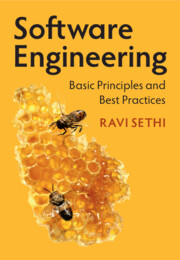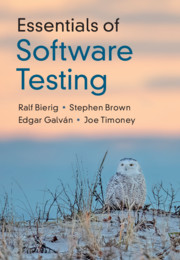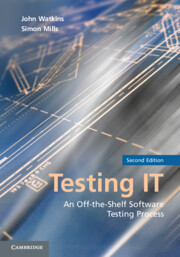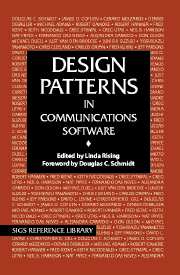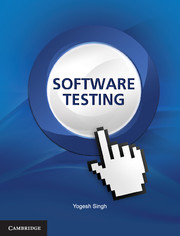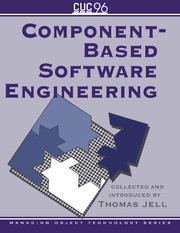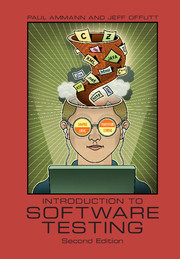Software Engineering
Basic Principles and Best Practices
$59.99 ( ) USD
- Author: Ravi Sethi, University of Arizona
- Date Published: November 2022
- availability: This ISBN is for an eBook version which is distributed on our behalf by a third party.
- format: Adobe eBook Reader
- isbn: 9781009063388
Find out more about Cambridge eBooks
$
59.99 USD
( )
Adobe eBook Reader
Other available formats:
Hardback
Looking for an examination copy?
If you are interested in the title for your course we can consider offering an examination copy. To register your interest please contact [email protected] providing details of the course you are teaching.
-
Software engineering is as much about teamwork as it is about technology. This introductory textbook covers both. For courses featuring a team project, it offers tips and templates for aligning classroom concepts with the needs of the students' projects. Students will learn how software is developed in industry by adopting agile methods, discovering requirements, designing modular systems, selecting effective tests, and using metrics to track progress. The book also covers the 'why' behind the 'how-to', to prepare students for advances in industry practices. The chapters explore ways of eliciting what users really want, how clean architecture divides and conquers the inherent complexity of software systems, how test coverage is essential for detecting the inevitable defects in code, and much more. Ravi Sethi provides real-life case studies and examples to demonstrate practical applications of the concepts. Online resources include sample project materials for students, and lecture slides for instructors.
Read more- Covers the 'why' and the 'how-to' of agile methods, requirements discovery, modular system design, and test selection so teams can choose and customize their development practices
- Illustrates the practical application of the concepts with real-life case studies and examples
- Offers tips for organizing a student team project, and templates with detailed questions to guide the iterations and keep the project on track
- Introduces metrics, measurement, data display and description, with applications for improving the qualities of products, processes, and operations
- Online resources include: lecture slides, image files, and report templates
Reviews & endorsements
‘If you are looking for an informative introductory text in software engineering, then this book is for you. This primer contains succinct and accessible text with recent examples. There isn’t another text on the market that captures the main essence of the field so successfully. I loved this book and highly recommend it to all software engineering students.’ Herbert H. Tsang, Simon Fraser University
See more reviews‘It is an exceptional book for software engineering or practicum classes because it teaches how to work with real customers using today’s development processes. It’s filled with motivating real-world examples and supplies a framework students can use to complete term projects successfully. This book, more than others I’ve seen, prepares students for their work environment after graduation.’ Joann J. Ordille, Rutgers University
‘This book will be invaluable for students, researchers, and especially for working programmers. It combines the hard-won wisdom of a senior software executive, the experiences of a seasoned programmer, real-life stories as a member and leader of software teams, and the skills of a superb writer and excellent teacher.’ Jon Bentley, United States Military Academy West Point
‘The focus on practice, with detailed examples on how to set up and run semester-long course projects, was extremely useful. This textbook covers exactly what is needed for the introduction to software engineering: the role and content of key areas, starting with the development process; going through requirements, architecture, testing, and ending with quality measurement. Everything is clearly articulated and grounded with timeless historical examples.’ Audris Mockus, University of Tennessee
Customer reviews
Not yet reviewed
Be the first to review
Review was not posted due to profanity
×Product details
- Date Published: November 2022
- format: Adobe eBook Reader
- isbn: 9781009063388
- availability: This ISBN is for an eBook version which is distributed on our behalf by a third party.
Table of Contents
Preface
1. Introduction
2. Software development processes
3. User requirements
4. Requirements analysis
5. Use cases
6. Design and architecture
7. Architectural patterns
8. Static checking
9. Testing
10. Quality metrics
Appendix A: a team project
Notes
References
Index.
Sorry, this resource is locked
Please register or sign in to request access. If you are having problems accessing these resources please email [email protected]
Register Sign in» Proceed
You are now leaving the Cambridge University Press website. Your eBook purchase and download will be completed by our partner www.ebooks.com. Please see the permission section of the www.ebooks.com catalogue page for details of the print & copy limits on our eBooks.
Continue ×Are you sure you want to delete your account?
This cannot be undone.
Thank you for your feedback which will help us improve our service.
If you requested a response, we will make sure to get back to you shortly.
×
